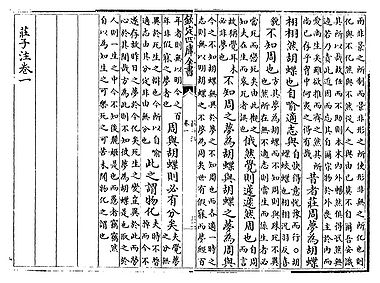"(2017Translation) 蝴蝶夢"의 두 판 사이의 차이
장서각위키
Sanghoon Na (토론 | 기여) 잔글 |
Sanghoon Na (토론 | 기여) 잔글 |
||
| 27번째 줄: | 27번째 줄: | ||
===Student 1 : (Sanghoon Na)=== | ===Student 1 : (Sanghoon Na)=== | ||
| − | |||
昔者莊周夢為胡蝶,栩栩然<ref> [http://sillok.history.go.kr/id/wga_11403025_004 栩栩然] [註 165] 허허연(栩栩然) : 기뻐하는 모양. 세조실록 45권 </ref>胡蝶也,自喻適志與!不知周也。 | 昔者莊周夢為胡蝶,栩栩然<ref> [http://sillok.history.go.kr/id/wga_11403025_004 栩栩然] [註 165] 허허연(栩栩然) : 기뻐하는 모양. 세조실록 45권 </ref>胡蝶也,自喻適志與!不知周也。 | ||
| 47번째 줄: | 46번째 줄: | ||
[But] Between Zhou and a butterfly, there must be a distinction! This is called the "transitory character of things."<ref> [http://www.acmuller.net/con-dao/zhuangzi.html 物化] 물화(物化): the transitory character of things (Charles Muller) </ref> | [But] Between Zhou and a butterfly, there must be a distinction! This is called the "transitory character of things."<ref> [http://www.acmuller.net/con-dao/zhuangzi.html 物化] 물화(物化): the transitory character of things (Charles Muller) </ref> | ||
| − | |||
<references/> | <references/> | ||
| − | + | --------------------- | |
===Student 2 : (Write your name)=== | ===Student 2 : (Write your name)=== | ||
2017년 7월 4일 (화) 22:21 판
| Primary Document | |
|---|---|

| |
| Title | |
| English | Butterfly dream |
| Chinese | 蝴蝶夢(Hudie meng) |
| Korean(RR) | 호접몽 |
| Document Details | |
| Genre | |
| Type | |
| Author(s) | Zhuangzi 莊子 |
| Year | |
| Key Concepts | |
| Translation Info | |
| Translator(s) | Participants of 2017 Summer Hanmun Workshop (Intermediate Training Group) |
| Editor(s) | |
| Year | 2017 |
목차
- 1 Original Script
- 2 Translation
- 2.1 Student 1 : (Sanghoon Na)
- 2.2 Student 2 : (Write your name)
- 2.3 Student 3 : (Write your name)
- 2.4 Student 4 : (Write your name)
- 2.5 Student 5 : (Write your name)
- 2.6 Student 6 : (Write your name)
- 2.7 Student 7 : (Write your name)
- 2.8 Student 8 : (Write your name)
- 2.9 Student 9 : (Write your name)
- 2.10 Student 10 : (Write your name)
- 2.11 Student 11 : (Write your name)
- 2.12 Student 12 : (Write your name)
- 2.13 Student 13 : (Write your name)
- 2.14 Student 14 : (Write your name)
Original Script
昔者莊周夢為胡蝶,栩栩然胡蝶也,自喻適志與!不知周也。俄然覺,則蘧蘧然周也。不知周之夢為胡蝶與,胡蝶之夢為周與?周與胡蝶,則必有分矣。此之謂物化。 《莊子.齊物論》
Translation
Student 1 : (Sanghoon Na)
昔者莊周夢為胡蝶,栩栩然[1]胡蝶也,自喻適志與!不知周也。
Formerly, Zhuang Zhou had a dream of becoming a butterfly, a happily fluttering butterfly talking to himself "This is what I want!" He did not know that it was he.
俄然覺,則蘧蘧然[2]周也。
Suddenly he awoke, and then clearly realized it was he.
不知周之夢為胡蝶與,胡蝶之夢為周與?
He did not know whether it was he dreaming of becoming a butterfly, or it was a butterfly dreaming of becoming him.
周與胡蝶,則必有分矣。此之謂物化[3]。 《莊子.齊物論》
[But] Between Zhou and a butterfly, there must be a distinction! This is called the "transitory character of things."[4]
- ↑ 栩栩然 [註 165] 허허연(栩栩然) : 기뻐하는 모양. 세조실록 45권
- ↑ 蘧蘧然 [註 166] 거거연(籧籧然) : 스스로 깨닫는 모양. 세조실록 45권
- ↑ 物化 물화(物化): the Transformation of Things (James Legge)
- ↑ 物化 물화(物化): the transitory character of things (Charles Muller)
Student 2 : (Write your name)
Student 3 : (Write your name)
Student 4 : (Write your name)
Student 5 : (Write your name)
Student 6 : (Write your name)
Student 7 : (Write your name)
Student 8 : (Write your name)
Student 9 : (Write your name)
Student 10 : (Write your name)
Student 11 : (Write your name)
Student 12 : (Write your name)
Student 13 : (Write your name)